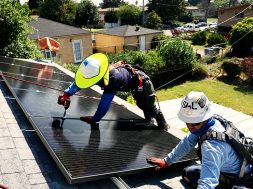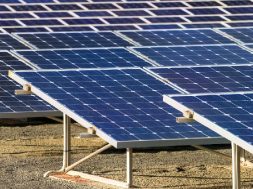
German Start Up supplies clean energy to Haiti hospital
Since the beginning of the year, Berlin-based company Qinous has been ensuring a clean energy supply at a hospital in Haiti with the help of its battery system. The compact lithium ion battery system provides for daytime grid stabilization, thus allowing for 100 percent penetration of solar power from a 230 kW roof-mounted PV system and complete shutdown of diesel generators during the day. The new facility was financed by the Swiss partnership HAS Haiti through private donations, and the PV battery system in Deschapelles is a joint project of the Albert Schweitzer Hospital and Qinous. For the first phase of the project, the young company provided a battery system with a 200 kW output and a capacity of 225 kWh.
“Haiti is very sunny, but the power supply in many places is still largely provided by expensive and environmentally harmful diesel generators simply because the grid infrastructure is lacking,” says Steffen Heinrich, Chief Technical Officer at Qinous. “Our battery system makes the secure delivery of renewables possible precisely under such circumstances since it works completely independently of the grid. It takes over the ‘grid-forming’ function of the diesel generator, thereby allowing the latter to be switched off entirely. Surplus electricity is stored and saved for later use. At the same time, the system regulates the hybrid network, thereby assuring the stable and secure operation of the PV system. The diesel generators come online only when the sun stops shining and the batteries have discharged.”
The Qinous battery intelligently balances power supply and demand in order to assure efficient provision of power and to minimize the use of diesel generators. In case of power failure, the battery automatically ensures power supply. The PV battery project significantly reduces the annual costs for fossil fuels and upkeep of the diesel generators. It also produces a reduction of CO2 emissions of approximately 200 tons per year.
“In Qinous, we’ve found a competent partner for implementing the PV project and true experts on energy storage and system control,” says Rolf Maibach, Board Member of the Albert Schweitzer Hospital in Deschapelles. “It was especially helpful that the Qinous engineers installed the battery system together with our on-site Haitian team and thoroughly trained the staff before the system entered into service. This guarantees that the local team possesses the necessary know-how to ensure a smooth operation of the system.”
The three-meter-high, six-meter-long and two-and-a-half-meter wide battery container was delivered by ship from Germany to Haiti. It now stands next to the hospital and is accessible at all times to trained technical staff. Thanks to its robust construction, it can withstand even the most extreme weather conditions. Qinous’ battery system distinguishes itself by being easy to implement. In this way, the engineering team wants to fulfil its aspiration of promoting a fossil-fuel-independent energy supply in as many off-grid regions as possible.
The integrated monitoring system allows the hospital’s power supply to be constantly observed and optimized. From its headquarters in Germany, Qinous analyzes the gathered data in order to ensure an optimally efficient supply and constant further development of the technology. In the long term, an even larger PV system and higher storage capacity is envisaged for the PV project in order to assure a clean energy supply for the Albert Schweitzer Hospital around the clock. The diesel generators will then be used only in a limited manner.
An additional battery system with a capacity of 500 kW/500 kWh will go into operation in Tabarre, a district of the Haitian capital Port-au-Prince. There, a 600 kWp PV system is currently being completed to provide a pediatric hospital and social campus with power. The project partner in that case is the children’s aid organization nph deutschland. Plans are in place to use the PV battery system for training and demonstration purposes for solar energy.











